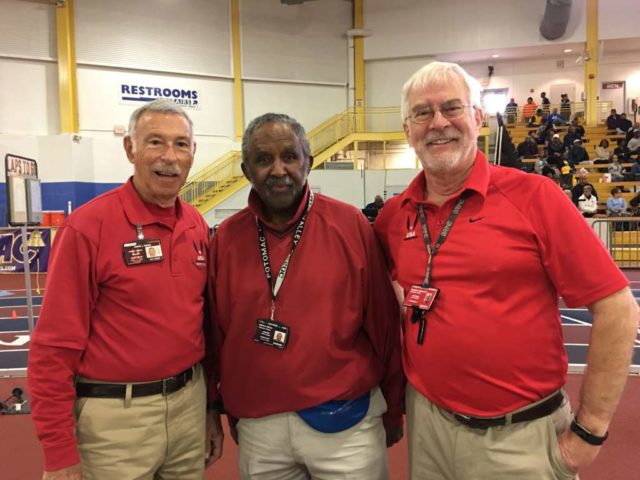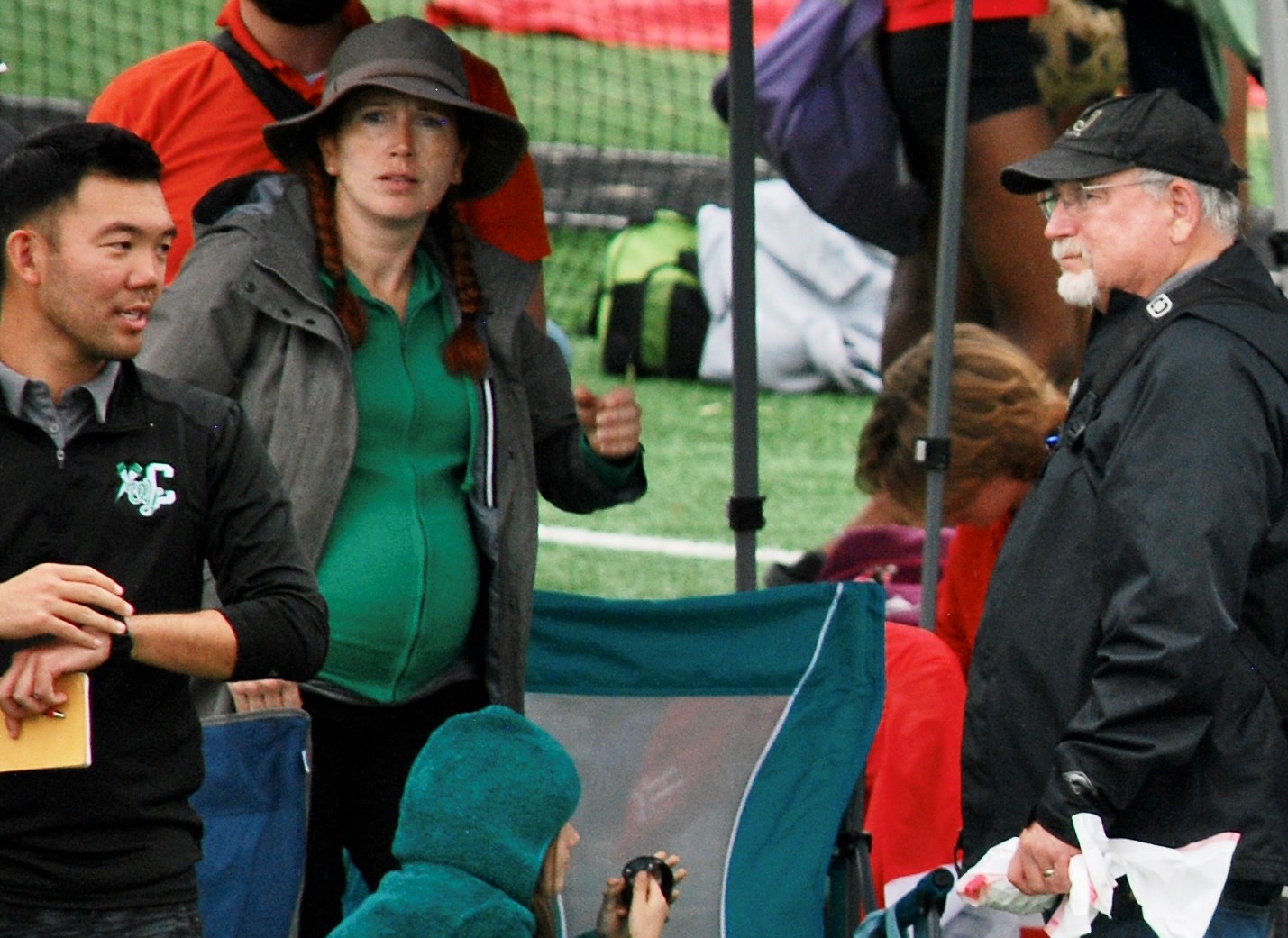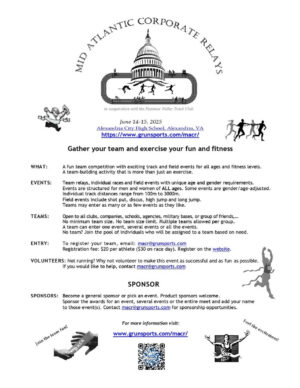
In 1967, college student Doug Edwards fired the gun to start a race at a track meet for the first time.
“My track coach at the time handed me a gun… and a box of shells and said you can earn $5 starting a track meet down at the local high school,” Edwards said. “And I thought that was like dying and going to heaven. And so I did. And it just sort of always stuck with me.”
After a break from officiating that included graduating from college, serving in the Army, getting married and having children, Edwards, now 72, has been starting races at track meets since the late 1980s.
Today, people can’t just pick up a gun and start meets, but it’s not tough to get involved as a track official. And officials are needed — both locally and nationwide.
Interested in becoming a track and field official?
Washington-area clinics:
Charles H. Flowers High School: Tuesday, March 5, at 7 p.m.
Northwest High School: Wednesday, March 6, at 6:30 p.m.
The National Federation of State High School Associations’ Become A High School Official website highlights the “shortage of high school officials in almost every sport.” Meanwhile, the National Association of Sports Officials has a Say Yes to Officiating website, which notes the “urgent need for sports officials” in the United States.
In Montgomery County, it’s part of track and field assignor Beth Muehl’s job to recruit new officials. She also assigns officials for cross country meets.
Across Maryland, she said, many officials are on the older side — which makes sense, since people who are retired, for example, have more flexible schedules.
But even if someone can only work one or two meets during a season, it’s still helpful to have that official on board, she said.
“We are definitely always looking to recruit younger,” she said.
Officials must attend a rules interpretation clinic and pass an open-book test each year, Muehl said. The rules interpretation clinic held in Montgomery County is coming up March 6 at Northwest High School, and there are others offered throughout the state prior to that.
Muehl said she would ideally have about 11 or 12 officials work an invitational meet — including two starters, two clerks, a referee, and officials for the long jump, triple jump, high jump, shot put, discus and pole vault.
She said about 80 percent of the time, she can fill the jobs that she needs to for meets. Otherwise, she has to rely on a volunteer, a coach or former coach, or someone who has partial availability.
Scott Munro became a track official in 2014. The Olney resident said he wanted to help out, and he ended up becoming a starter.
“I think I’m still the young guy,” said Munro, who is 37, in regards to Montgomery County officials.
Munro ran track and cross country in high school and college, and he likes that officiating allows him to be involved in the sport without having to commit the same amount of time as a coach.
Munro, who works in mergers and acquisitions, said he usually starts four or five dual meets and a couple invitationals a year for Montgomery County. He likes to be available for days when there are multiple meets.
He said it’s rewarding for him to be involved, and although officials are paid, he sees it as a way to give back — and a way to pay back those volunteers from his time as a young athlete. Often, a meet participant will thank him for volunteering, he said.
John Holten, 54, a shot put official, also sees officiating as a way to contribute to the community. His running club, the Montgomery County Road Runners Club, stresses the importance of volunteerism, he said.
A longtime runner, Holten got involved in officiating last spring after getting an email from his former neighbor, Seann Pelkey, who coaches cross country and track at Quince Orchard High School.
Holten had run track and although he’d never participated in shot put, it seemed to him like something he would be able to officiate. So, he decided to choose that as an option, and he now officiates that event at Montgomery County meets. Officiating has provided an opportunity for him to learn more about that aspect of track and field, he said.
Holten, a health care data analyst who lives in Rockville, passed the test and watched some videos on YouTube before getting started, and at his first meet as a shot put official, coaches were there to help.
Muehl said the challenge isn’t getting involved, but having the confidence to be an official, particularly for an event the person may not already be entirely familiar with. But the way to become more confident is to jump in.
“You put yourself in there and have your rule book with you, and you ask veterans around you, and you learn and you gain experience, and you get a lot more confident then,” Muehl said.
Edwards found that there wasn’t a book specifically for starters, so he wrote one — “The Art of the Start in Track and Field.” He hopes the book will get others interested in the role.
The book goes beyond the basic rules, covering topics such as equipment needed and how to get jobs as a starter, he said.
He gave an early version of the book to people who are interested, and he said he hopes to sell the book to people with access to coaches.
Edwards, who lives in Mount Airy and works as an insurance broker, starts meets for Montgomery and Howard counties and Southern Maryland, and he’s traveled to other locations for starting, too. He estimated he works between 40 to 50 meets in a year — mostly track, although he also starts cross country meets.
Edwards has kept each shell he’s fired, and he calculated based on weight how many he may have.
“I’m in excess of 35,000 times I’ve pulled the trigger,” he said.
It’s important for people to have the right attitude before getting into officiating, Edwards said, with fairness being key.
“A fair start, to me, is the essence of a track meet,” he said.
He also enjoys working with kids, some of whom, over the years, have gone on to become coaches.
A love of working with kids is something that Muehl noted a potential official should have as well, since the meet participants are high school students. She also said officials should be excited and passionate about the sport of track and field and able to adapt if things don’t go as planned.
Muehl, who has been in her current role as assignor for a year, said she’s gained a new view on the sport she’s been involved in for more than three decades.
“I feel like I have a much better perspective of the entire sport of track and field because I’ve now been an athlete, a coach and an official,” she said.
Recent Stories
Looking for our race calendar? Click here Submit races here or shop local for running gear
Hero Dogs 5K9
Hero Dogs Inc will host its 5th Annual 5K9 race at the Congressional Cemetery on Saturday, May 17th, beginning at 8 am. There will also be a 1K Fun Run. The 1K Fun Run will start at 8 am sharp
Mid Atlantic Corporate Relays
Team relays, individual races and field events with unique age and gender requirements. Events are structured for men and women of all ages.
Some events are gender/age graded. Individual track distances range from 100m to 3000m.
Field events include shot






